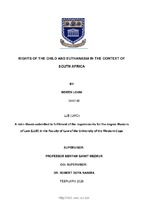| dc.contributor.advisor | Mezmur, Benyam Dawit | |
| dc.contributor.author | Louw, Sideen | |
| dc.date.accessioned | 2020-11-27T12:04:07Z | |
| dc.date.available | 2020-11-27T12:04:07Z | |
| dc.date.issued | 2020 | |
| dc.identifier.uri | http://hdl.handle.net/11394/7586 | |
| dc.description | Magister Legum - LLM | en_US |
| dc.description.abstract | Euthanasia is controversial topic that attracts conversations on grounds of
fundamental human rights and freedoms. The opinions of legal scholars are
inconsistent because while some view euthanasia as a gross violation of one’s human
rights, others argue that it should be regarded as a fundamental human right.
Extending the ‘right to die’ to children is more controversial because they are
considered to be a vulnerable demographic and generally presumed to be legally
incompetent to exercise their rights autonomously. The State aims to protect children
by restricting their rights rather than enhancing their autonomy and including them in
the discussion. To that end, children are often excluded from decision-making on the
understanding that they are legally incompetent and cannot comprehend the
consequences of their decisions. | en_US |
| dc.language.iso | en | en_US |
| dc.publisher | University of Western Cape | en_US |
| dc.subject | Autonomy/Agency | en_US |
| dc.subject | Children’s Rights | en_US |
| dc.subject | Cognitive ability | en_US |
| dc.subject | Euthanasia | en_US |
| dc.subject | Human Rights | en_US |
| dc.title | Rights of the child and Euthanasia in the context of South Africa | en_US |
| dc.rights.holder | University of Western Cape | en_US |

